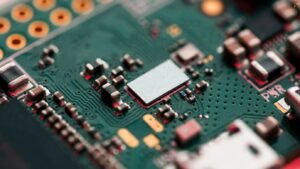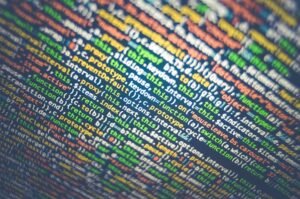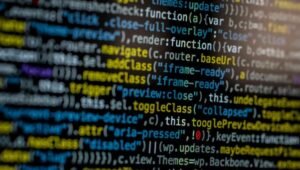AI Application Areas
Artificial Intelligence (AI) has become one of the most influential technologies today, transforming the way we live and work. From virtual voice assistants to self-driving cars, AI has found applications in various fields. In this article, we will explore some of the key areas where AI is being implemented and the impact it is having.
Key Takeaways:
- AI application areas are diverse and continually expanding.
- AI has made significant advancements in healthcare, finance, and customer service.
- AI is enhancing productivity, efficiency, and accuracy in industries like manufacturing and logistics.
- AI is also being utilized in the fields of education, government, and law enforcement to improve decision-making processes.
1. Healthcare: AI is revolutionizing the healthcare industry, with applications ranging from diagnosing diseases to personalized patient care. *AI-powered systems can analyze vast amounts of medical data and assist doctors in accurate diagnosis and treatment planning.
2. Finance: AI is transforming the financial sector by automating tasks, improving fraud detection, and enhancing customer experiences. *AI algorithms analyze financial data to provide real-time insights for investment decisions and risk management.
3. Customer Service: AI-powered chatbots are becoming increasingly popular in customer service, providing quick and accurate responses to customer queries. *These chatbots can handle routine tasks and free up human agents to focus on more complex issues.
| Applications | Benefits |
|---|---|
| Medical diagnosis | Improved accuracy and speed |
| Drug discovery | Accelerated research process |
| Remote patient monitoring | Better patient outcomes |
4. Manufacturing: AI is optimizing industrial processes and increasing efficiency in manufacturing. *Machine learning algorithms analyze data from sensors to predict machine failures and schedule maintenance, reducing downtime.
5. Logistics: AI is streamlining supply chain management by using predictive analytics to optimize routes, reduce costs, and improve delivery times. *AI-powered systems can track inventory levels, predict demand, and recommend optimal inventory levels.
- Education: AI is being used in education to develop personalized learning experiences for students and provide intelligent tutoring. *AI algorithms analyze student data to adapt learning content and pace to individual needs.
- Government: AI is transforming the public sector by automating administrative tasks, improving data analysis, and enhancing decision-making processes. *AI has the potential to improve public service delivery and optimize resource allocation.
| Applications | Benefits |
|---|---|
| Fraud detection | Improved security and detection rates |
| Algorithmic trading | Increased speed and accuracy in trading |
| Customer personalization | Enhanced customer experience and satisfaction |
AI is transforming various sectors, including law enforcement, where it is used for facial recognition, crime prediction, and forensic analysis. *AI systems can analyze large volumes of data, identify patterns, and assist in solving crimes.
In summary, AI is making significant strides in diverse fields, revolutionizing industries such as healthcare, finance, customer service, manufacturing, logistics, education, government, and law enforcement. As technology continues to advance, we can expect AI to play an increasingly crucial role in shaping our future.
| Applications | Benefits |
|---|---|
| Facial recognition | Improved identification and surveillance |
| Crime prediction | Enhanced proactive policing |
| Forensic analysis | Increased efficiency and accuracy in investigations |

Common Misconceptions
Misconception 1: AI will replace human jobs completely
Many people believe that the rise of Artificial Intelligence (AI) will result in the complete replacement of human jobs. However, this is not entirely true. While AI has the potential to automate certain tasks and streamline processes, it cannot replicate human creativity, critical thinking, and emotional intelligence.
- AI can automate repetitive tasks, allowing humans to focus on higher-level thinking and problem-solving.
- AI is more effective as a tool to enhance human capabilities rather than replacing them entirely.
- Jobs that require social interaction, empathy, and creativity are less likely to be automated by AI.
Misconception 2: AI is only relevant in the tech industry
Another common misconception is that AI is only applicable in the tech industry. While it is true that AI has made significant advancements in fields like machine learning and robotics, its applications extend far beyond just technology.
- AI is being utilized in healthcare to improve diagnosis and treatment techniques.
- AI is being used in finance to detect fraud and optimize investment strategies.
- AI is being applied in agriculture to enhance crop yield and improve resource management.
Misconception 3: AI is a futuristic concept with no real-world applications
Some people believe that AI is a far-fetched concept with no practical applications in the real world. However, AI is already being incorporated into various aspects of our daily lives.
- Virtual assistants like Siri and Alexa utilize AI algorithms to understand and respond to human queries.
- Recommendation systems on streaming platforms like Netflix and Spotify use AI to suggest personalized content.
- AI-powered chatbots are becoming increasingly popular in customer service and support industries to provide quick and accurate responses.
Misconception 4: AI is limited to large corporations and institutions
It is often assumed that only large corporations and institutions have the resources and expertise to implement AI. However, AI tools and technologies are becoming more accessible and affordable for businesses of all sizes.
- Cloud-based AI platforms and services are available for startups and small businesses to leverage AI capabilities.
- Open-source AI frameworks and libraries allow developers to build and customize AI applications without significant financial investments.
- AI-as-a-service models provide cost-effective options for businesses to incorporate AI functionalities without building their own infrastructure.
Misconception 5: AI is all-knowing and infallible
There is a common misconception that AI systems are infallible and capable of providing accurate results in all situations. However, like any technology, AI systems have limitations and can make errors.
- AI algorithms heavily rely on the quality and quantity of data available for training, which can lead to biased or incomplete results.
- AI models can struggle with handling ambiguous or unfamiliar situations that fall outside their training data.
- Human oversight and validation are crucial in ensuring the reliability and ethical usage of AI systems.

Table: AI in Healthcare
AI is revolutionizing healthcare by improving diagnostic accuracy, predicting patient outcomes, and personalizing treatment plans. In this table, we showcase some specific applications of AI in the healthcare industry.
| Application | Description |
|——————|————————————————–|
| Medical Imaging | AI analyzes medical images for faster diagnosis. |
| Virtual Nurses | AI-powered chatbots provide personalized care. |
| Drug Discovery | AI accelerates the process of finding new drugs. |
| DNA Sequencing | AI algorithms help analyze DNA sequences. |
| Disease Forecast | AI predicts disease outbreaks for proactive care.|
Table: AI in Education
Artificial intelligence is transforming education by enabling personalized learning experiences, automating administrative tasks, and supporting real-time student feedback. Let’s explore some areas where AI is making a significant impact in education.
| Application | Description |
|——————|————————————————-|
| Adaptive Learning| AI adapts teaching methods based on student needs.|
| Intelligent Tutoring| AI tutors provide personalized guidance. |
| Plagiarism Detection| AI identifies copied content for evaluation.|
| Learning Analytics| AI tracks student progress and offers insights. |
| Language Learning| AI apps enhance language learning experiences. |
Table: AI in Finance
Artificial intelligence is reshaping the financial industry by automating repetitive tasks, detecting fraud, and predicting market trends. Take a look at these remarkable AI applications in the finance domain.
| Application | Description |
|——————|————————————————–|
| Robo-Advisors | AI-powered platforms offer automated investment advice. |
| Fraud Detection | AI algorithms identify and prevent financial fraud. |
| Automated Trading| AI systems execute trades with speed and precision. |
| Credit Scoring | AI assesses creditworthiness accurately and efficiently.|
| Risk Assessment | AI models predict potential financial risks. |
Table: AI in Transportation
Artificial intelligence is revolutionizing transportation by improving safety, optimizing routes, and enabling autonomous vehicles. This table presents some fascinating applications of AI in the transportation industry.
| Application | Description |
|——————|—————————————————|
| Autonomous Vehicles| AI enables self-driving cars and trucks. |
| Traffic Optimization| AI reduces traffic congestion and improves overall efficiency. |
| Predictive Maintenance| AI predicts maintenance needs to prevent breakdowns. |
| Supply Chain Management| AI optimizes logistics and inventory management. |
| Smart Traffic Lights| AI adjusts traffic signals based on real-time conditions. |
Table: AI in Retail
AI is transforming the retail industry by enhancing customer experiences, enabling personalized recommendations, and streamlining inventory management. Explore some exciting AI applications in retail below.
| Application | Description |
|——————-|—————————————————|
| Chatbots | AI-powered chatbots assist customers with inquiries. |
| Recommendation Engines | AI suggests products based on individual preferences. |
| Visual Search | AI enables searching for products using images. |
| Inventory Management| AI optimizes stock levels to prevent product shortages. |
| Pricing Optimization| AI analyzes data to set optimal product prices. |
Table: AI in Entertainment
Artificial intelligence is revolutionizing the entertainment industry by creating immersive experiences, personalizing content recommendations, and generating realistic animations. Here are some exciting AI applications in the world of entertainment.
| Application | Description |
|——————–|—————————————————|
| Virtual Reality | AI enhances virtual reality experiences. |
| Content Recommendation| AI suggests personalized movies, music, etc. |
| Deepfake Technology| AI creates lifelike but artificially generated media.|
| Emotion Analysis | AI detects emotions to tailor content accordingly. |
| Real-time Translation| AI provides instant translation in various languages. |
Table: AI in Manufacturing
Artificial intelligence is revolutionizing manufacturing by improving efficiency, automating processes, and enhancing quality control. Here are some remarkable AI applications in the manufacturing industry.
| Application | Description |
|——————–|—————————————————–|
| Quality Inspection | AI examines products for defects and abnormalities. |
| Predictive Maintenance| AI predicts maintenance needs to prevent breakdowns.|
| Supply Chain Optimization| AI improves overall supply chain efficiency. |
| Collaborative Robots| AI-powered robots work alongside human workers. |
| Resource Allocation| AI optimizes resource allocation for maximum productivity. |
Table: AI in Agriculture
Artificial intelligence is transforming agriculture by increasing efficiency, enabling precision farming, and optimizing crop management. Explore the significant applications of AI in the agricultural sector.
| Application | Description |
|——————–|—————————————————–|
| Crop Monitoring | AI monitors plant health and detects crop diseases. |
| Soil Analysis | AI analyzes soil composition for optimized cultivation.|
| Drone Technology | AI-powered drones assist in various agricultural tasks. |
| Weather Prediction | AI predicts weather patterns for informed decision-making.|
| Irrigation Systems | AI optimizes water usage for efficient irrigation. |
Table: AI in Customer Service
Artificial intelligence is revolutionizing customer service by providing faster responses, enhancing interactions, and automating support tasks. Take a look at how AI is transforming the field of customer service.
| Application | Description |
|——————–|—————————————————–|
| Chatbots | AI-powered chatbots provide instant customer support. |
| Sentiment Analysis | AI analyzes customer sentiments for personalized service.|
| Voice Recognition | AI understands and responds to customer voice queries. |
| Call Routing | AI automatically directs customer calls to the right department.|
| Knowledge Base | AI-powered knowledge bases offer self-service solutions. |
Table: AI in Energy
Artificial intelligence is revolutionizing the energy sector by optimizing energy consumption, enhancing safety, and facilitating efficient maintenance. Here are some notable applications of AI in the energy industry.
| Application | Description |
|——————–|—————————————————–|
| Smart Grid | AI optimizes energy distribution in smart grids. |
| Energy Forecasting | AI predicts energy demands for effective planning. |
| Fault Detection | AI detects faults and abnormalities in energy infrastructure. |
| Optimization Models| AI optimizes energy systems for maximum efficiency. |
| Renewable Energy | AI enhances the integration and management of renewable energy sources. |
In summary, artificial intelligence (AI) has become an indispensable tool across various industries, revolutionizing processes, optimizing operations, and improving user experiences. The tables presented above provide a glimpse into some of the fascinating applications of AI in different sectors, such as healthcare, education, finance, transportation, retail, entertainment, manufacturing, agriculture, customer service, and energy. As AI continues to advance, it holds the potential to reshape and drive innovation in numerous areas, making our lives more efficient and enjoyable.
AI Application Areas
Frequently Asked Questions
What are some common applications of Artificial Intelligence?
Artificial Intelligence (AI) is utilized in a wide range of areas, including but not limited to healthcare, finance, autonomous vehicles, customer service, and cybersecurity.
How does AI contribute to the healthcare industry?
In healthcare, AI is utilized to improve diagnostics, develop personalized treatment plans, and analyze large volumes of medical data to identify potential patterns and insights.
Can AI be applied to financial services?
Absolutely! AI is increasingly being used in the financial industry for tasks such as fraud detection, algorithmic trading, and risk assessment.
What is the role of AI in autonomous vehicles?
AI plays a critical role in enabling autonomous vehicles to perceive their surroundings, make real-time decisions, and navigate safely. It encompasses technologies like computer vision, machine learning, and sensor fusion.
How is AI involved in customer service?
AI is used in customer service to automate routine inquiries, provide chatbot assistance, and analyze customer sentiment through natural language processing techniques.
What are some AI applications in cybersecurity?
AI is utilized in cybersecurity to detect and mitigate security threats, identify vulnerabilities, and analyze patterns to predict potential attacks.
Can AI help improve educational systems?
Yes, AI can enhance educational systems by providing personalized learning experiences, intelligent tutoring, and automated grading and feedback processes.
How does AI contribute to the field of agriculture?
In agriculture, AI is used to optimize crop yield, monitor crop health, automate farm operations, and provide predictive analytics for weather and pest management.
What potential does AI have in the field of robotics?
AI enables robots to perceive and interact with the environment, learn from experiences, and adapt their behavior accordingly. It has applications in fields such as manufacturing, healthcare, and exploration.
Are there any ethical considerations related to AI applications?
Yes, ethical considerations surrounding AI applications include issues like privacy, bias, accountability, and the potential impact of AI on workforce displacement.





